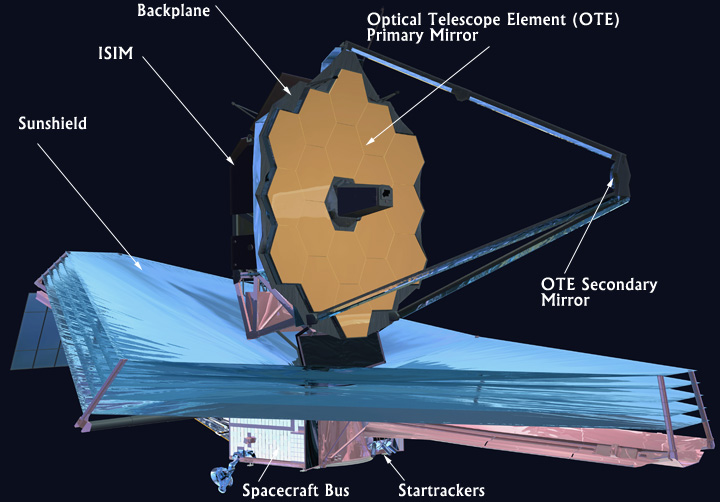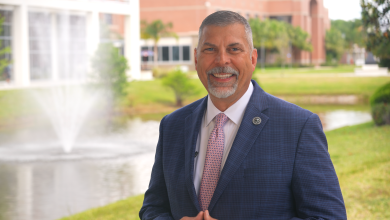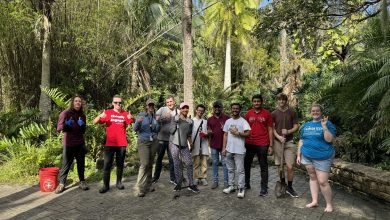To the Stars
With a focus on program planning and control, Rich Ryan ’88 is playing a key role in developing the next space telescope for NASA.
By Tom Kertscher
The scope of the work of Rich Ryan ’88 is, well, cosmic.
Perhaps that could be said of anyone who works for the National Aeronautics and Space Administration.

But Ryan, who earned his aviation management bachelor’s degree in the College of Aeronautics, played a key role in developing NASA’s James Webb Space Telescope, a space-based observatory that will serve thousands of astronomers worldwide. The Webb, an international collaboration between NASA and the European and Canadian space agencies, is scheduled to be launched on a rocket from French Guiana in October 2021. According to NASA, it will study “every phase in the history of our universe,” from the Big Bang, to the formation of solar systems capable of supporting life on planets like Earth, to the evolution of our solar system.
How?
“The Webb’s instruments are primarily infrared,” Ryan said. “What happens with infrared, when you’re looking through infrared, you can look through cosmic clouds and things like that.”
The Webb, named after James Webb, who ran NASA from 1961 to 1968, will build on the discoveries of the Hubble Space Telescope. According to the agency, it will be able to “look further back in time to see the first galaxies that formed in the early universe and to peer inside dust clouds where stars and planetary systems are forming today.”
“We’ll be looking deeper into the universe than we ever have in the past,” Ryan said. “That alone is so exciting.”
Ryan has worked since 1992 at NASA’s Goddard Space Flight Center outside of Washington, D.C., in Greenbelt, Maryland. The center describes itself as the “home to the nation’s largest organization of scientists, engineers and technologists who build spacecraft, instruments and new technology to study Earth, the sun, our solar system and the universe.” It is home to both the Hubble and Webb space telescopes; it also manages communications between mission control and orbiting astronauts aboard the International Space Station.
We’ll be looking deeper into the universe than we ever have in the past.
Rich Ryan ’88, deputy project manager for resources for the Webb telescope
From late 2010 through late 2018, Ryan served as the Webb’s deputy project manager for resources, responsible for resources management activities, including financial and performance measurement, budgeting, project control/support, configuration management and scheduling. He helped oversee a major replan of the project in order to get the Webb ready for launch. Ryan said he worked with major contractors and international partners on issues such as building flight hardware and software. He helped make decisions on questions such as how many contractors to use and how many tests should be done, all with an eye to staying on schedule while managing risks.
“My role really had to do with a big focus on PP and C—program planning and control,” Ryan said. “A lot of my effort, once we established a baseline across the entire program, was to take a look at cost and schedule performance.

“NASA takes its commitment very seriously, no matter what mission it is. There’s a lot of technology, there’s a lot of development and emphasis that goes into making sure we get it right.”
Ryan, now chief of Goddard’s Program and Projects Resources Management Office, previously worked on the Hubble Space Telescope, which has orbited Earth since 1990. Among other things, the Hubble has been credited with detecting the first organic molecule discovered on a planet outside our solar system and helping scientists determine the process of how planets are born.
Ryan has won the NASA Exceptional Achievement Medal, the NASA Outstanding Leadership Medal and various other NASA awards. He said his time at Florida Tech helped raise his aspirations, partly through serving as the school president of the American Association of Airport Executives.
“I was able to attend AAAE conferences with airport managers and aviation corporations and hear them speak. And as a 20-year-old kid, it’s pretty exciting. You actually get a perspective of the real world,” Ryan said.
What did we say about cosmic?
In October 2020, Ryan became the program business manager for NASA’s Mars Sample Return program, a proposed mission to return samples from the surface of Mars to Earth. The mission would use robotic systems and a Mars ascent rocket to collect and send samples of Martian rocks, soils and atmosphere to Earth for detailed chemical and physical analysis.
Ryan said the Webb will always be one of his most valued experiences at NASA.
“That’s one of my highlights, being able to work on a flagship mission that has international visibility, that will really help mankind understand more,” he said. “Just being a part of that, even if it’s on a project management side, it’s very gratifying.”
This piece was featured in the winter 2021 edition of Florida Tech Magazine.






